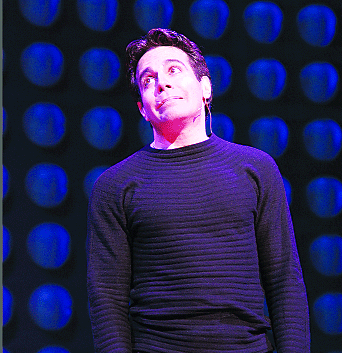Mario Cantone is hilarious, not new; John Jeter’s Martha Mitchell cartoonish
Mario Cantone is an incredibly funny man, a versatile and thoughtful performer and an altogether appealing personality. His comedy can be vulgar without being offensive and angry without being mean—a rare feat in today’s world of comics, especially when compared with the spiritually bankrupt hostility of another Broadway stalwart, Jackie Mason.
Cantone’s performances in “The Crumple Zone” and “Assassins” were nothing short of brilliant, though most people would know him as the incessantly acerbic Anthony from “Sex and the City,” the role that undoubtedly opened up the doors on Broadway to him. Cantone has a stage persona that for all the apparent bravado and outrage has a surprising softness; it’s a wonderful dichotomy.
All of this is on display in his new, predominantly marvelous, one-man show “Laugh Whore,” now at the Cort Theatre. There are moments that are falling down funny, delivering the kinds of belly laughs that are in short supply in much comedy today. There are the impersonations of the foreign cab drivers in New York and stories about his crazy family that are almost scary they’re so funny, as is his story about why he did not take the part of Timon in “The Lion King,” and, yes, “turned down Disney.” His keen ear for voices and very specific physical interpretations of the characters mark him as a performer of no uncommon skill, notably in his impersonations of Liza Minnelli and Judy Garland.
So why is it when the laughter fades that one feels vaguely disappointed? I think it’s because after two hours of putting out for laughs—the literal definition of “Laugh Whore”—there is something too polished and too predictable about the entire evening. Engaging as Cantone’s self-written material is, mostly, the vast majority of the audience would have to think back nearly 40 years to remember what Judy Garland was like on her TV series, and there is a whole generation of people who are now middle-aged who never saw this stuff originally. “Cats” has been closed a long time; why are we talking about it? And, yes, Shelley Winters was a parody of herself in “The Poseidon Adventure” or on “From the Actor’s Studio,” but where does that touch our lives today?
For all the technical skill, the material seems dated and we’ve seen it or something very like on other chestnuts such as “The Carol Burnett Show.” This was our parents’ comedy, and funny as it is, the inescapable vintage feel of the piece—down to the picking a straight man out of the audience to sing a love song to—seems incredibly Vegas. It’s funny, but it’s too safe, and if ever there were a time when we needed some dangerous comedy, it’s now.
This is an enjoyable show, make no mistake, even if you’re decades too young to get some of the references, but in going down the road of “safe” material, Cantone blunts the edge that makes him otherwise so compelling on so many levels. In “Assassins,” he threw all caution to the winds and gave a riveting and harrowing performance. That’s not what’s going on here. I suppose the problem with Cantone identifying himself as a “whore” is that his viability stems from giving people what they want—or think they want—even to the point of losing himself and what makes him so unique. It’s unfortunate to see him reverting to pandering to conventional notions of what is gay, what is funny and what is an easy laugh and ultimately playing it so, you should pardon the expression, straight.
Surely there was more to Martha Mitchell, the woman who provoked the Watergate scandal with her tireless phone calls and desire to expose Richard Nixon, than is on display in John Jeter’s dimensionless play “Dirty Tricks” at the Public. You wouldn’t know it, though. This Martha Mitchell is loud and garish enough, and the facts of her phone calls and meddling in the Watergate burglary, ostensibly to protect her husband John, the disgraced president’s disgraced attorney general, are clearly stated, but there is no human character sufficiently developed to allow us to feel anything for her.
Jeter has not dug beneath Mrs. Mitchell’s public quotes and news reports of the chaos surrounding them to find any kind of compelling or relevant drama in her experience.
There is a compelling case to be made that she was a victim of revenge, that even her husband abandoned her to support Nixon, that she was right all along. Yet rather than casting her as a latter day Cassandra who is herself crushed by tragedy that she foresaw, Jeter creates a woman who is mostly unhinged and out of control. It is as if he has tried to cram so many facts and events into the play—and relied on his one-woman structure to portray them—that he lost his opportunity to tell a story about a woman who would not keep her place, who would challenge authority, who paid the price for her courage but was never vindicated.
Judith Ivey does the best she can with what she’s been given. She’s a consistently strong performer with bankable star power. It’s always a pleasure to see her, and in her best moments—largely repeating facts and verbatim information from Mrs. Mitchell—she is a wonderful theatrical force. However, there are moments, such as defacing a picture of her husband with lipstick, that seem silly because they seem false and done for dramatic effect rather than as an integral expression of character.
It all seems patched together, with the telephone and the television relied on too heavily to bring other much-needed characters into the play. As it was in Martha Mitchell’s life, the phone is a major character in this play. It’s a shame that the connections are so faulty.


































